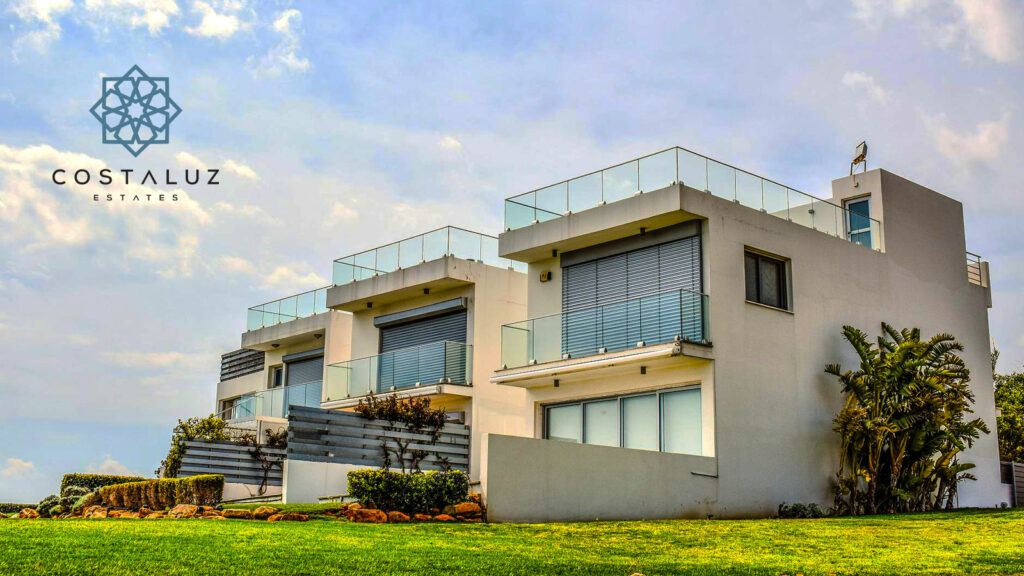
Whenever a client comes to our office in Conil de la Frontera or Zahara de los Atunes-Atlanterra and asks us whether they should buy an illegal property and what the risks involved are,
we advise them that they are better off buying a small legal apartment (one with building permits) in an urbanised area than a dream villa that was built without planning permission in a non-urbanised area.
This advice usually goes unheeded, which we can fully understand when for the same price as a legal apartment in La Barrosa you can buy a spacious villa with a garden, garage, pool and barbecue. At the end of the day, people want experiences, and a detached home with a private garden and pool is more appealing than living with a noisy next-door neighbour or sharing a pool with lots of strangers.
In these cases, we tell our clients that the only thing we can do is check that the property is not on protected, flood-prone or public land (for example, drover’s roads), and, above all, that no disciplinary action has been brought against the property (or that there are no planned roads or public buildings in the current town plan) that could result in total or partial demolition of the property. We can also check that, due to the age of the building, the government can no longer initiate legal proceedings to request demolition (on land not suitable for building (non-specially protected) there is a statute of limitations of six years since construction was complete to be able to request a demolition order). All of this is not to say that buying an illegal property is without its risks because there are legal implications of which buyers need to be aware. Having been asked on numerous occasions to explain what those implications are, we thought we would write this post so that potential buyers visiting the Costa de la Luz in search of their dream home know exactly what they are up against if they decide to buy an illegal property.
The following are some of the implications of buying an illegal property:
1.- YOU WILL NOT BE ABLE TO APPLY FOR A PERMIT TO UNDERTAKE EXTENSIONS OR REFURBISHMENTS:
Technically, an illegal property is classified as “asimilado a fuera de ordenación”.
This classification is described in articles 173 and 174 of Law 7/2021 (LISTA), a new law to promote sustainable development in Andalusia that was recently approved on 1 December.
We will not include the entire articles word-for-word here, but the main points are:
a.- Any property for which building is complete and against which the government is no longer entitled to exercise any legal action to request demolition (more than six years have passed since construction was completed and the property is not on specially protected land) will be classified as “asimilado a fuera de ordenación”.
b.- A declaration that the property is safe from demolition (whereby the government is not entitled to start legal action to demolish the property) must be issued in an administrative proceeding that concludes with a ruling by the town hall stating that the property is classified as “asimilado a fuera de ordenación” (better known as AFO).
c.- Until the town hall declares the property as “asimilado a fuera de ordenación” (AFO), the owners will not be entitled to basic services like mains electricity or water. An illegal property without this AFO classification cannot receive these services because the utility companies will systematically refuse to provide them.
d.- The AFO declaration does not mean the property is legal, only that the government is not entitled to initiate legal proceedings to request demolition (due to the statute of limitations).
e.- The ruling that classifies the property as AFO must be registered in the land registry. This is mainly to warn potential buyers of the situation and the limits it entails.
f.- For buildings classified as AFO, permits can be granted to undertake structural maintenance and repair work, but any extensions or refurbishments will not be authorised.
2.- FINANCING CHALLENGES:
Banks do not usually take kindly to illegal properties, which means that any mortgage application to buy one will probably be turned down, even if the client has an impeccable financial record. This is because banks view such properties as a minefield of risks with the possibility of the government or the courts ordering demolition, which would result in the loss of the collateral (the property) that guarantees recovery of the money loaned.
In fact, legislation (specifically article 11.1.d. of Royal Decree 716/2009, 24 April) states that illegal properties cannot be used as collateral for loans and credits because they do not represent a ‘stable and long-term’ asset.
Having said that, our experience has shown us that not all banks closely follow this law, with a large number of them granting mortgages to buy this type of property (although the majority do not, which makes buying and selling them more of a challenge).
3.- FUTURE PROBLEMS WITH PUBLIC WORKS THAT COULD AFFECT THE PROPERTY IF THE TOWN PLAN IS AMENDED
Although properties in urbanised areas can also be expropriated or demolished by the government to carry out public works (for example, if the town hall decides to widen a street and your property is “in the way”), this is much less likely than in areas that have not yet been urbanised. This means that the town hall could decide to build a number of public roads in as-yet non-urbanised areas of Chiclana de la Frontera which would result in the expropriation and demolition of certain properties.
The reason this is more likely in non-urbanised areas is because the former do not yet have an established network of roads or (more often than not) public buildings or public spaces like schools, medical centres, parks, and so on.
We must also remember that in urbanised areas, unless there are plans to improve them, the town plan has already been implemented. In the case of non-urbanised areas, however, a plan might include a number of roads, public buildings and other decisions which could change overnight if the town plan is annulled (this has happened four times in the last twenty years in Chiclana de la Frontera).
These are the main implications of buying a so-called ‘illegal’ property. Although a legal build is the less risky option, buying a property without permits can also be the right choice. If you do decide to proceed, make sure your estate agent and lawyer are fully aware of the planning laws and conduct a thorough analysis of the legal status of the property, to minimise stress and ensure a smooth home-buying experience.

Juan Antonio Rodríguez García
Lawyer
CostaLuz Estates Legal Department
+34 617073669
Please note that any information provided through the CostaLuz Estates blogs, website or social media pages is for informational purposes only and should not be used as the basis for making any particular decisions. Please remember that legislation and case law can change over time and the articles published through this medium may not be up-to-date, which is why we recommend you seek individual specialist advice.
CostaLuz Estates are property consultants who provide estate agency services to international clients who have fallen for the charms of the Costa de la Luz. Our own internal legal department, led by the reputed law firm TempleCAMBRIA, our membership of the Association of International Property Professionals and our use of the external dispute settlement procedure overseen by the Property Ombudsman mean you can rest assured that your decision to buy your dream home on the Costa de la Luz will be a smooth, enjoyable and stress-free experience.
